The Egg Route: Farm to Table, 1953
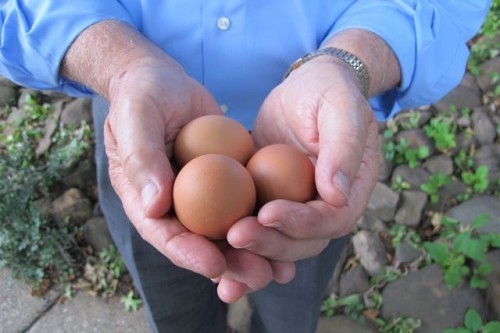
Conversation and a big bowl of steaming mashed potatoes traveled around the long oak table the day I first heard about my dad's egg route. It was another Flick holiday, a plate of ham, a basket of rolls—everything eventually passed to the card table, pushed up snug to seat the 20 plus people my family has become.
My dad likes to reminisce, and I like to ask questions. We talk through dessert (usually a selection of 5 or 6 homemade pies), and continue sometimes even after most everyone else has retired to the living room to nap and watch sports. While I can't remember what I ate for breakfast, he easily recalls the name and hometown of a person he worked with for two months, 58 years ago.
I learned that day that the urban eater's desire for local farm fresh eggs isn't a new thing. That the act of farm-to-table kept my parents in gas money and connected to both the city and their rural roots for the first four years of their marriage.
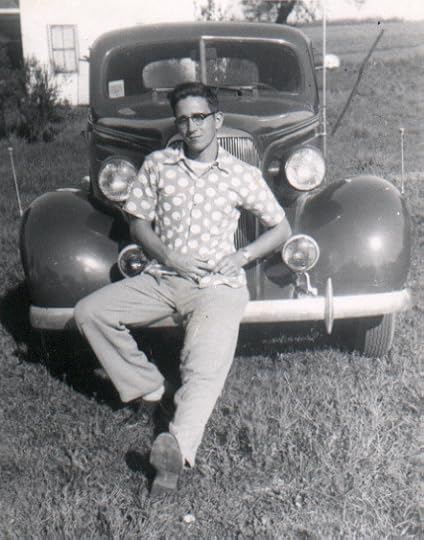
In 1953, just graduated from high school, Dad took a job with the Pennsylvania Highway Dept. Survey Corp. His supervisor was a mean guy, unfair to his workers and foul mouthed. My father wasn't thrilled with this situation, and after the supervisor threw Howard Raybuck from West Hickory up against a bus and said that he'd beat the [expletive] out of him if he made a mistake again, Dad knew he needed to find a different job.
Tionesta, Pennsylvania, located in Forest County, at the southwestern edge of the Allegheny National Forest was and still is a tiny town surrounded by small farmsteads. My mother's family ran the McWilliams Dairy Farm, and my relatives still grow crops on their land. From the age of 7 Dad did farm work. There's a great story about him driving a big truck when he was so little he couldn't see out the windshield while engaging the clutch.
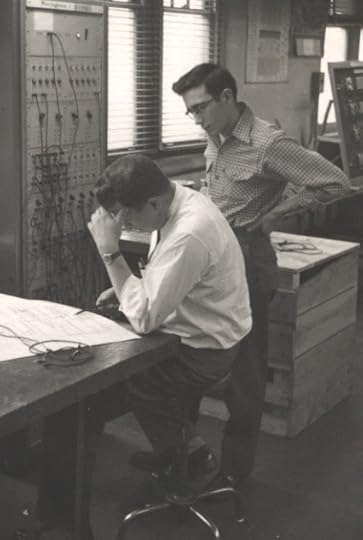
Just around the time that Dad yearned for a career change, his friend Karl Karlson suggested he apply for a job at the Westinghouse Electric Plant in Pittsburgh, where Karl worked. The plant, a sturdy brick building on Penn Avenue, rested between the neighborhoods of Point Breeze and Wilkinsburg, across the street from the (still there) shot-and-a-beer Evergreen Cafe.
My father made the trek into the city like so many other rural men in the U.S. at that time. As he put it, "That next Monday I drove to Pittsburgh, walked into the Westinghouse plant, and asked the Personnel Manager, Logan Roan, for any job that would allow me to enroll in a night school program. Roan said I could start as a Core Winder the next week at a salary of $156 per month."
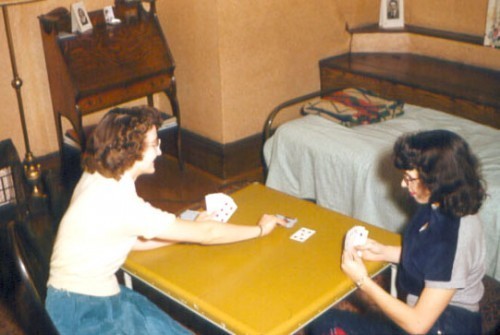
Dad, 18 years old, moved to Pittsburgh, moved in with Karl and his sister Marsha, a school teacher, and my parents set a wedding date for that November. They'd gotten engaged at their senior prom, and soon were married and renting their first apartment in Wilkinsburg along with Dad's twin sister Doris, two hours from their families. Both Doris and my mother found secretarial jobs and they split the $50-a-month rent three ways. "We ate lots of Spam, potatoes, and things we could bring back from the farm. We did quite well," Dad noted, "and were able to save some money."
I should note here both the Flick and McWilliams clans were large—6 siblings in the Flick family and 12 in the McWilliams'. Every weekend my parents drove back to Tionesta to have supper at the McWilliams' on Friday and Saturday, and then Sunday lunch at the Flick's. Grandma Flick cultivated a huge, beautiful hillside garden and was an obsessive canner, pickler, quilter, and rug hooker. I still remember the taste of her unsweetened concord grape juice and her sweet-and-sour pickle relish, always served in a cut class bowl.
Mom hung out with her sisters—Edna, Lois, and Arlene. Dad hunted and trout fished with my uncles Gene, Maurice, Jake, Harry, and Ralph. Mom's sisters made the same weekly weekend trek in from Erie with their husbands and children in tow. They would all check in at the McWilliams Farm upon arrival. "I don't know how Grandma and Grandpa McWilliams put up with us," Dad said, "but they would be upset if we didn't come home."
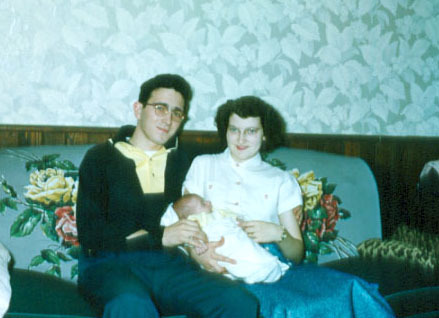
What does this have to do with eggs?
By 1955, Dad's salary was up to $250 a month. My brother Danny was born. They moved into a bigger apartment, and Doris moved back to Tionesta to marry Jim Tucker. "Somewhere in the process our Pittsburgh friends knew we were going to the Farm in Tionesta every weekend," Dad told me. "I told them Shirley's brother had a chicken farm, and I had access to good fresh eggs. At first I would bring back a few dozen as a favor for a few friends. Then the word got around that I could bring back fresh eggs at a good price."
Since my parents had some difficulty paying the 25 cents a gallon that gasoline cost at the time, Dad determined they could subsidize their weekend trips if he charged people 10 cents more than he paid for the eggs. And so the egg route was born.
Dad picked up the eggs in Tionesta each weekend, and then delivered them Monday morning before his workday began. Around this time, Westinghouse had moved into a 4-story plant in East Liberty, radically upping potential egg sales. The egg route exploded to over 100 dozen per week. "Management, security officers, secretaries, people from all parts of the plant were my customers," Dad said.
I love the vision of my young, optimistic father walking into the plant (stark industrial rooms filled with wires and buzzing electronic progress), carrying trays of freshly laid eggs.
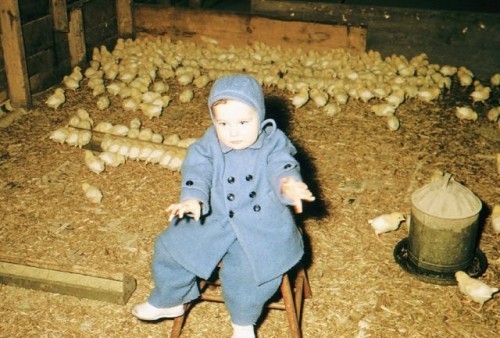
Ralph, Mom's oldest brother, a "gentleman farmer," kept the chicken coop. He gathered the eggs each day, brought them to the spring house, and put them through an egg washer. The second level of the spring house was damp from the creek running through the room below. "The grain and various chicken feed had a good smell," Dad remembered. "The spring house was cluttered with egg baskets, egg boxes, and various milk separator parts and binder twine." Ralph made a good supply of dandelion wine each year and stored it in the spring house to keep it cool. "He would offer me a drink from time to time," Dad said. "It was real smooth."
Dad rigged a candling device, checking each egg for the blood spots that his urban customers adamantly refused. The double-yolked eggs, on the other hand, were extremely popular. "They loved them," he said. At the peak of his egg business he had to visit 3 to 4 farms to fill his orders. He made some good friends with local farmers in Redbrush—the Alexanders, Korbs, and Mongs. "When I would go to the Korbs for eggs during the middle of the winter," Dad remembered, "she would give me some fresh apples that they kept in their spring house." Keep in mind that from December 1954 to June 1957 my brother Danny was in the car with my parents, the eggs, suitcases, and the bags of canned goods and garden produce Grandma Flick handed out.
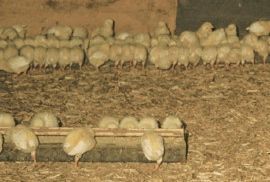
They traveled to Tionesta on Route 8 through Oil City, no expressways yet existing. "Pittsburgh was still a smoky city, and you would have soot on your car and house a lot," Dad said. "The houses we lived in had Coal Furnaces. You would notice the clear air and quiet nights when we were in Forest or Clarion County. Our favorite stop on each trip was the ice cream store in Harrisville." Hughes, also known as The Ice Cream Factory, has been in operation since 1928. Gary Hughes runs the store, still there on Harrisville's Main Street. They serve their own Penn-Gold Ice Cream.
By this time Dad had inched another notch up the long Westinghouse ladder to a position working directly with the engineers, making $300 a month. "They were pleased that I was going to night school four nights per week. When I had some spare time I would do my homework, and they would help me with any math or science questions," Dad said. Most of Dad's fellow employees at Westinghouse were from the Pittsburgh area, and a boy migrated in from the country was a novelty to them. Dad, a friendly and curious guy, made lots of friends.
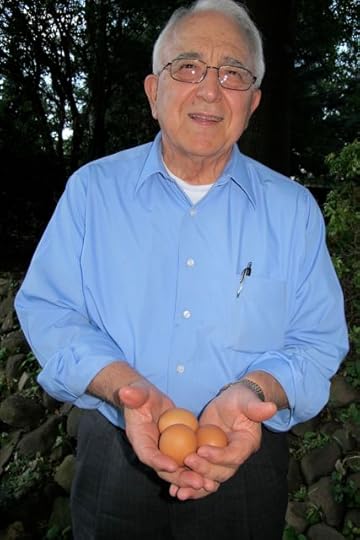
Yet by July 1957 he had to make a hard decision. My father wanted to become an engineer, working his way through school, but he needed to make more money than Westinghouse could offer him with his present skills. Even though he'd earned an academic scholarship that year, he and Mom decided to move to Koppel and then Beaver Falls, Pennsylvania, and my father trained to become a life insurance salesperson. With this move, the egg route came to an end. You can imagine Dad's disappointed customers reluctantly buying eggs at their local super market each week.
My parents settled in Beaver Falls and still live there today. They purchased Uncle Ralph's farm in 1987, making a big circle in this egg story, and it is now a weekend retreat for my family, and where I got married 14 years ago. The chicken coop is gone, but the outline of its stone foundation is still there. The spring house remains the water source for the farmhouse, and Dad said when they bought the farm there were still a few jugs of dandelion wine in there. He was tempted, but decided it was best to dump them out.
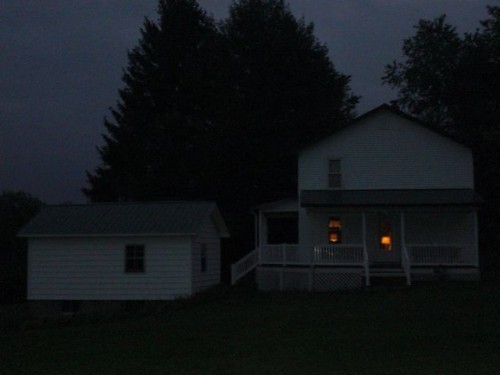
These days when I visit and walk out into the farmyard to inhale the wonderful silky night and zillions of glittering stars, I think about how hard it must have been some Sundays to pack up that car and head back into the city, slag heaps aglow.
Shirley Flick's Deviled Egg Recipe
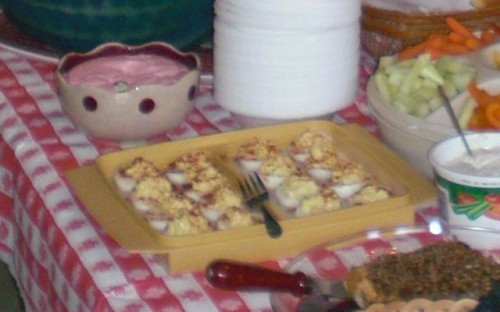
1 dozen fresh eggs
¼ – ½ tsp. prepared mustard
Miracle Whip
Paprika
Salt and pepper
My mother makes her deviled eggs from memory, but she wrote down this recipe for me. They are delicious.
Hard boil one dozen eggs by cooking for 20 minutes, remove from water and cool to a temperature you can handle them. Peel off the shells, cut in half, and remove yolk. Mash the yolk, add salt and pepper, 1/4 to 1/2 teaspoon of prepared mustard, and enough Miracle Whip to create a firm consistency. Fill the egg halves, with the prepared filling and sprinkle with paprika. Place in a deviled egg dish, refrigerate until meal time.
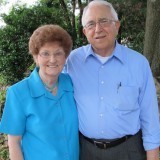
Don and Shirley Flick have been married 57 years. Don Flick is now a retired Senior Partner at Metropolitan Life, where he has worked for 54 years. Shirley Flick is president of the Heritage Valley Auxiliary, where she has served more than 18,000 volunteer hours. They have three grown children, seven grandchildren, and two great grandchildren.
Sherrie Flick's Blog
- Sherrie Flick's profile
- 38 followers



